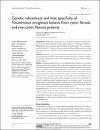Genetic relatedness and host specificity of Pseudomonas aeruginosa isolates from cystic fibrosis and non-cystic fibrosis patients

عرض / فتح
التاريخ
2014-11-20المؤلف
Abdulwahab, AtqahTaj-Aldeen, Saad J.
Doiphode, S
Abdulla, Shaikha H.
Muhammed, Ramees
Ahmed, Irshad
Abdeen, Yasmine
Sadek, Omnia
Abu-Madi, Marawan
...show more authors ...show less authors
البيانات الوصفية
عرض كامل للتسجيلةالملخص
Background: Pseudomonas aeruginosa is one of the primary pathogens isolated more frequently in cystic fibrosis (CF) and it exhibits innate resistance to a wide range of antibiotics.
Purpose: We sought to determine whether the highly prevalent genotypes of P. aeruginosa are specifically linked to CF patients and have any related multidrug antibiotic resistance. Isolates from hospitalized non-CF patients and from environmental sources were also genotypically analyzed.
Methods: Collections of P. aeruginosa from lower respiratory secretions (n=45) were genotyped using pulsed-field gel electrophoresis (PFGE). Phenotypic screening for antibiotic susceptibility was performed for the common antimicrobial agents by E-test and automated Phoenix method.
Results: P. aeruginosa isolates from CF (n=32), hospitalized non-CF patients (n=13), and environment sources (n=5) were analyzed. The population structure of P. aeruginosa is highly diverse and population-specific. All PFGE results of P. aeruginosa isolates fall among four major clusters. Cluster 1 contained 16 P. aeruginosa isolates from CF patients and two from environmental sources; cluster 2 contained 11 P. aeruginosa isolates from CF and one each from non-CF and environmental sources; cluster 3 contained 12 P. aeruginosa isolates from hospitalized non-CF patients and two P. aeruginosa isolates from one CF patient and one environmental source; and cluster 4 consisted of three isolates from CF patients and one from the environment. The majority of multidrug-resistant P. aeruginosa isolates were in clusters 3 and 4. P. aeruginosa isolates from CF patients were resistant to ciprofloxacin (34.4%) followed by resistance to amikacin and gentamicin (each 28%), whereas the majority of isolates from non-CF patients were resistant to meropenem (69%) and were grouped in cluster 3.
Conclusion: PFGE of P. aeruginosa isolates from CF patients shows a high degree of similarity, suggesting specific adaptation of these clones to CF-affected lungs. The hospitalized non-CF cluster has a different clonal origin, indicating specific clustering in a specific location, suggesting hospital-acquired P. aeruginosa infections.
المجموعات
- أبحاث مركز البحوث الحيوية الطبية [875 items ]
- العلوم الصحية - كلية الآداب والعلوم (قبل 2016) [151 items ]

